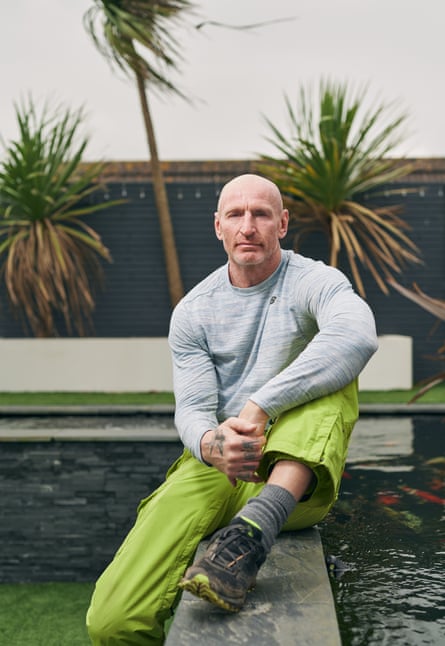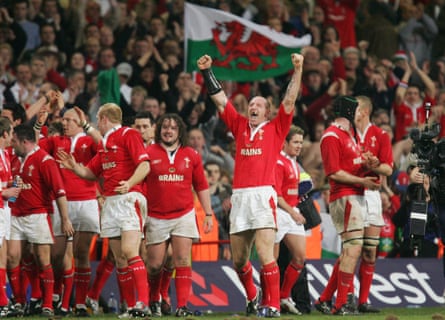‘I don’t have a job, I have a purpose,” Gareth Thomas says intently as we move into the second hour of a conversation about prejudice and ignorance, hate and fear. These are dark themes but Thomas’s cackle and roar spools from my laptop as he confronts them with defiant humour. I don’t think I have laughed like this for a long time even though the subject is often bleak.
Thomas is a profane force whether talking about Aids in the 1980s or It’s a Sin, the recent Channel 4 series written with such exuberance and sobriety by Russell T Davies about that very subject. He is even more powerful when confronting homophobia in sport, especially in football, or the barely concealed discrimination he sees all around him. Thomas is a former Wales, and British and Irish Lions, rugby captain who came out and then switched codes to play rugby league as a gay man. He is now living with HIV and facing a rising tide of prejudice he feels is even worse than when he announced the truth of his sexuality in 2009.
When the quips and anecdotes have all been told, he becomes very serious. Thomas has reflected on the fact that he and Tom Daley are the only two high-profile gay men in British sport. He then shakes his head when I ask if it might be easier for a gay footballer to come out now than it would have been more than a decade ago when he made that same decision.
“No,” he says. “If anything it’s probably more dangerous now as social media has allowed people to discriminate even more openly. I don’t see anything that’s been done within football apart from token gestures. Nobody can say to me that if a footballer came out as gay tomorrow they would be absolutely safe at every single ground they went to. The fact is their ability will mean nothing and their sexuality made out to be everything.”
Thomas pauses as he looks steadily into the camera. “Sports people want to be judged on our ability. We want to show fans what we’re capable of. Deep down, we want them to like us. We want them to cheer us. I can’t imagine somebody putting themselves in the position of thinking: ‘I’m going to be open about my sexuality but that means I will face an element of abuse every week.’
“That’s the world we live in right now and the only way you would change that is if you create a new environment in football. You could come out in business or the media and feel safe. In most forms of work you could come out. But not in football.
“Justin Fashanu, the only top-flight gay professional footballer who spoke about his sexuality, killed himself [in 1998]. You look at the tragic story of an amazingly talented footballer and think: ‘If he came out now how much has changed since then?’ You might want to perceive that football’s evolved but the reality is that nobody could say you would be free from abuse if you came out.”
How many footballers have spoken to him about the possibility of coming out? “I’d say five over the last 10 years. They were of varied ages and backgrounds. You think about all the problems they’ve had to overcome in their own lives even before you start thinking about attitudes in football.”
Football’s habitual defence is that homophobia, or any form of prejudice, is “society’s problem”. Thomas is withering in response. “Things are said in a football stadium that would never be allowed on the street. So do not tell me there’s an excuse. If you think it’s society’s problem you will never, ever change football.
“We need to create environments in stadiums where people are judged on their ability rather than their sexuality, race, gender or religion. I understand football. If Swansea play Cardiff, the home fans want to make it hostile for the away team. But we don’t have to call people a faggot to create a hostile environment.”

Has Thomas been able to convince anyone in football they need to be proactive in tackling homophobia? He shakes his head. “There is an acknowledgement of the problem but never an acknowledgement of how they might deal with it. I’ve been trying to do that with a Football Offences Act to protect people against homophobia. I’ve had meeting after meeting. All I’m asking is to amend the act that was created to prevent racism because people are more likely to use homophobic language in a sporting stadium than racism now. I started this four years ago and it still hasn’t been done. But I’ll never give up.”
Thomas points out that the problem seeps from the top down and he cites the decision to host the 2018 and 2022 World Cups in Russia and Qatar. “You just think: ‘What are you trying to promote? Do you understand what diversity is?’ There are so many organisations constantly popping up on the telly saying they’re trying to do something and then you hear that somebody else has suffered racial or homophobic abuse. We’ll all kick up a fuss for a couple of days but nothing will ever be done. Six months later the same thing happens again.
“You look at the influence of football and think of how many countries in the world where it’s still illegal to be gay. And you remember they gave the World Cup to Russia and Qatar.”
Homophobia infects all sport. Thomas was invited to give a talk in Japan in the buildup to the delayed Tokyo Olympics but he felt dejected after meeting a small group of gay Japanese men who explained how they are forced to live in the shadows. “Maybe I think too simplistically,” he says, “but why would you host a world global event in 2021 in a country that has so many problems with people of a certain sexuality?
“Russia for the World Cup? Japan for the Olympics? You go there and there are lights everywhere. It looks fantastic. They want the world to go there, but they don’t want to accept the diversity that the world brings.”
Thomas has written a compelling new book, Stronger, which is also a moving account of him discovering he had HIV, being forced by a blackmailer and the Sun to finally reveal the truth to the world, before he finds acceptance and a new purpose to tackle ignorance and prejudice. It is clear his social conscience has intensified during these tumultuous years that began with him convinced he had received a death sentence as he knew little about HIV beyond memories of 1980s’ adverts carrying Aids tombstones.
Unlike the early victims of Aids, who often lost their families first and then their lives, Thomas has been embraced by his own family and he is healthy. He takes one pill a day and the medication means he is free to live a normal life without any fear of transmitting the disease. That liberty has inspired him to set up and lead the Tackle HIV campaign to overcome the stigma and misunderstanding around a virus that once carried terrifying consequences.
“They say knowledge is power but so much of society is ignorant about HIV. It saddens me when people say they don’t need to know about HIV because it will never affect them. It’s like the FA saying to me: ‘We don’t need to know about sexuality in football, because we’ve got no gay players.’ I just want to give them the knowledge. The campaign has been very successful and It’s a Sin has also given society a reason to talk about the subject again.
“There were parts I didn’t enjoy watching because what happened in the 1980s with Aids was so horrible. Forty years ago I could have been one of them people dying. But I feel a massive connection to the programme and it made me extremely happy because it showed a togetherness and community spirit I discovered in rugby. What I found really important was that we all thought: ‘Jeez. That really happened? Gay people were treated like that?’”
His voice trails away before he looks up again. “If we don’t have Russell Davies and other people talking about things which made us sick to the stomach because they were allowed to happen, it can very quickly re-emerge. That discrimination isn’t gone. It’s just a lot more hidden. Those prejudiced people still exist. I see them leave the cafe when I come in and the people who don’t want to go to the toilet after me.”
Thomas won 100 caps for Wales and he says: “In sport I saw life as a heterosexual, white, working-class male. I’ve since seen what it’s like to live as an openly gay male with HIV where discrimination is obvious. I’ve seen how it is to be both privileged and non-privileged, left alone or discriminated against, and I feel passionate about making the silent discriminators realise what they are doing.
“I’ve walked into a cafe and sat down and sneezed because I’ve got dust up my nose. I’ve seen the family next to me nudging and pointing and as their food comes they get up and leave. That discrimination isn’t as obvious but it’s still there.”

Does homophobia still blight rugby? “I’ve heard it at so many matches. So I don’t think rugby is in a good place in terms of people being able to come out either. We’ve had Nigel Owens, a referee, and me. That’s two people out of millions. But I do think rugby creates a better atmosphere than football. Rather than waiting for the police to do something, lots of people in rugby will say: ‘I refuse to sit here with my daughter or my son or my friends and listen to you saying that.’ There’s not much of that in football.”
What has he made of Wales winning their first two Six Nations games this year? “I’m not going to lie,” he says with a laugh. “I was not very confident, so it’s been delightfully unexpected. But, being a really proud Welshman, it’s all irrelevant as it’s Wales v England on Saturday.
“England are going to be a lot better than they’ve been so Wales have to lift themselves. But if we win that we could be talking about Wales playing France for a grand slam. Who would have thought that?”
Thomas rocks in delight when I ask about his future plans. “I’ve got lots of work I’m really passionate about. But I love the fact my life is so varied. I sometimes wake up not having a clue what I’m doing this week. That would once have petrified me. Now it excites the living shit out of me. I want to keep tackling HIV but I love the fact there’s a big, gaping black hole about what I do next. It’s waiting for me to walk down there and light it up.”
Visit www.tacklehiv.org for more information. Gareth Thomas’s Stronger is published by Ebury.
